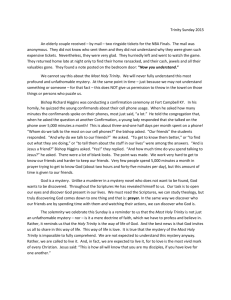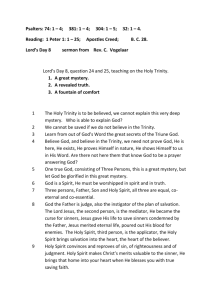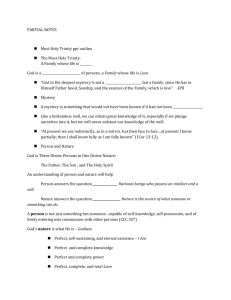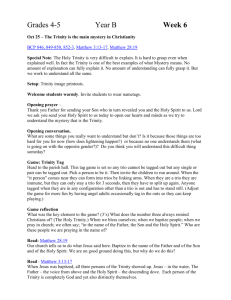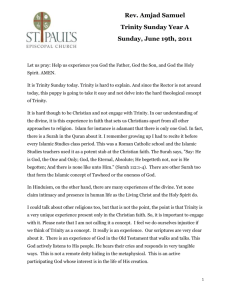Catholicism 101
advertisement
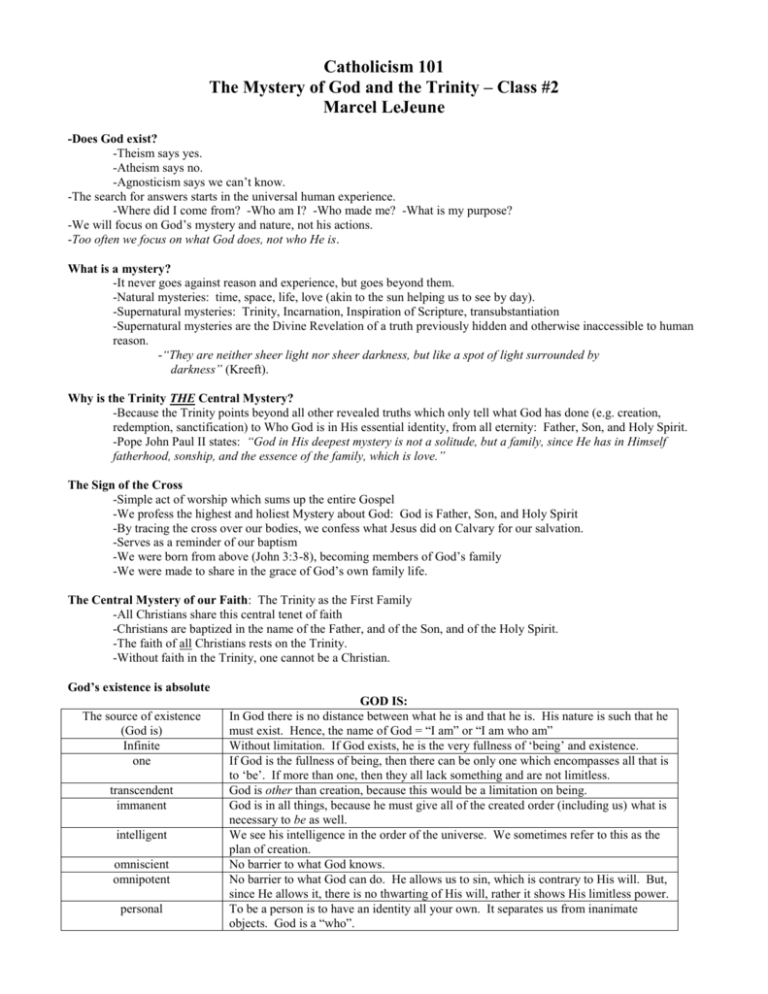
Catholicism 101 The Mystery of God and the Trinity – Class #2 Marcel LeJeune -Does God exist? -Theism says yes. -Atheism says no. -Agnosticism says we can’t know. -The search for answers starts in the universal human experience. -Where did I come from? -Who am I? -Who made me? -What is my purpose? -We will focus on God’s mystery and nature, not his actions. -Too often we focus on what God does, not who He is. What is a mystery? -It never goes against reason and experience, but goes beyond them. -Natural mysteries: time, space, life, love (akin to the sun helping us to see by day). -Supernatural mysteries: Trinity, Incarnation, Inspiration of Scripture, transubstantiation -Supernatural mysteries are the Divine Revelation of a truth previously hidden and otherwise inaccessible to human reason. -“They are neither sheer light nor sheer darkness, but like a spot of light surrounded by darkness” (Kreeft). Why is the Trinity THE Central Mystery? -Because the Trinity points beyond all other revealed truths which only tell what God has done (e.g. creation, redemption, sanctification) to Who God is in His essential identity, from all eternity: Father, Son, and Holy Spirit. -Pope John Paul II states: “God in His deepest mystery is not a solitude, but a family, since He has in Himself fatherhood, sonship, and the essence of the family, which is love.” The Sign of the Cross -Simple act of worship which sums up the entire Gospel -We profess the highest and holiest Mystery about God: God is Father, Son, and Holy Spirit -By tracing the cross over our bodies, we confess what Jesus did on Calvary for our salvation. -Serves as a reminder of our baptism -We were born from above (John 3:3-8), becoming members of God’s family -We were made to share in the grace of God’s own family life. The Central Mystery of our Faith: The Trinity as the First Family -All Christians share this central tenet of faith -Christians are baptized in the name of the Father, and of the Son, and of the Holy Spirit. -The faith of all Christians rests on the Trinity. -Without faith in the Trinity, one cannot be a Christian. God’s existence is absolute The source of existence (God is) Infinite one transcendent immanent intelligent omniscient omnipotent personal GOD IS: In God there is no distance between what he is and that he is. His nature is such that he must exist. Hence, the name of God = “I am” or “I am who am” Without limitation. If God exists, he is the very fullness of ‘being’ and existence. If God is the fullness of being, then there can be only one which encompasses all that is to ‘be’. If more than one, then they all lack something and are not limitless. God is other than creation, because this would be a limitation on being. God is in all things, because he must give all of the created order (including us) what is necessary to be as well. We see his intelligence in the order of the universe. We sometimes refer to this as the plan of creation. No barrier to what God knows. No barrier to what God can do. He allows us to sin, which is contrary to His will. But, since He allows it, there is no thwarting of His will, rather it shows His limitless power. To be a person is to have an identity all your own. It separates us from inanimate objects. God is a “who”. free good spiritual (simple) eternal Has a will to choose. But, always chooses correctly. To be “good” is to be as we are supposed to be. God is being to the fullest of being. Therefore God is perfectly good. A body is limited to time, space and change, therefore God is spirit. Since God is not material, he is not bound by time. God is nontemporal. Basics of the doctrine of the Trinity: 1. In the one divine nature, there are three persons, the Father, the Son, and the Holy Spirit. 2. No one of the persons is either of the others, each is wholly himself. 3. The Father is God, the Son is God, the Holy Spirit is God. 4. They are not three Gods but one God. Person and Nature We have to be able to distinguish between person and nature. -nature determines what we are; -person describes who we are. Old Testament: -Gen. 1:26 “Then God said, "Let us make man in our image, after our likeness” -Gen. 3:22 “Then the LORD God said, "Behold, the man has become like one of us” New Testament: -John 1:1-3 “In the beginning was the Word, and the Word was with God, and the Word was God. He was in the beginning with God; all things were made through him, and without him was not anything made that was made.” -Mt. 3:16-17 “And when Jesus was baptized, he went up immediately from the water, and behold, the heavens were opened and he saw the Spirit of God descending like a dove, and alighting on him; and lo, a voice from heaven, saying, "This is my beloved Son, with whom I am well pleased."” -Mt 28:19 “Go therefore and make disciples of all nations, baptizing them in the name of the Father and of the Son and of the Holy Spirit,” What Difference does the Mystery of the Trinity make for us? -The Trinitarian Mystery affects everything…what we believe, how we act, our understanding of who we are. Four Doctrinal Areas (Hahn) 1 - Creator and Creation -Instead of seeing God only as Creator, we see Him as Our Father by grace. -Instead of mere creatures, we are made in God’s image and likeness to live as His sons and daughters. -Instead of living in a vast, impersonal cosmos, we have a world which is fashioned by Our Father to be a royal palace and holy temple. 2 - Covenant and Law -Instead of having just a legal contract, we have a covenant (a sacred family bond) with God. “Covenant” is what God does because “covenant” is who God is. -Instead of seeing the laws of God as arbitrary and imposing, we see God’s laws as expressions of God’s fatherly widsom, goodness, and love. 3 - Sin and Judgement -Instead of understanding sin to mean merely broken laws, we understand that sin means broken lives and broken homes. At root, sin comes from our refusal to keep the covenant promises, and so we lose (in mortal sin) the grace of divine sonship. -Instead of seeing punishment for sin as an act of a vindictive God who imposes an impersonal legal pronouncement upon us sinners, we see the judgement of God as fatherly love and discipline; He burns away our impurities (Heb. 12:29). 4 - Salvation and the Church -Instead of seeing salvation as only freedom from sin, we see it as freedom for kinship with God; we are not only forgiven, we “become partakers of the divine nature” (2 Pet. 1:4). -Instead of understanding Church as a nice community of common believers, we understand the Church to be the universal Family of God, an extension of Jesus
